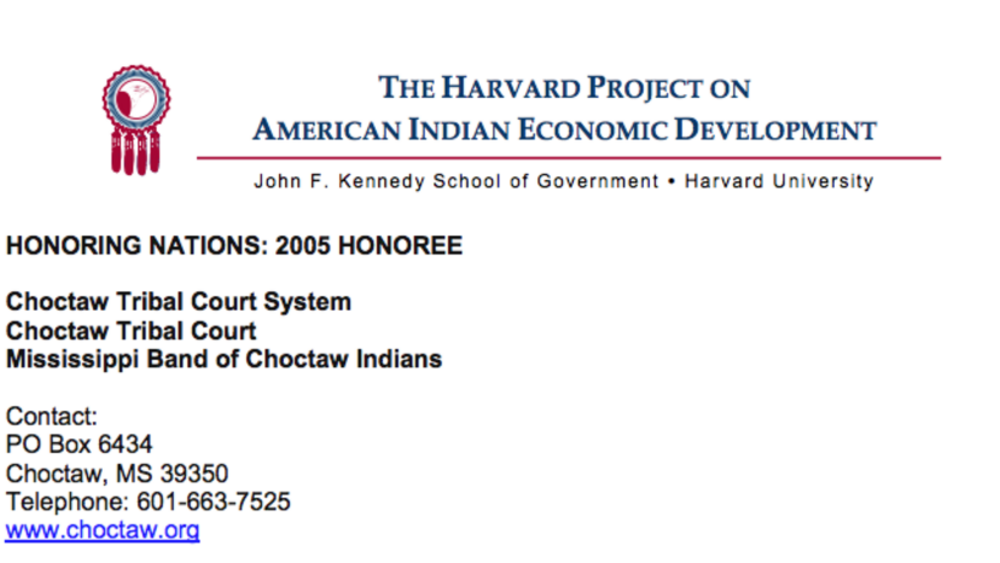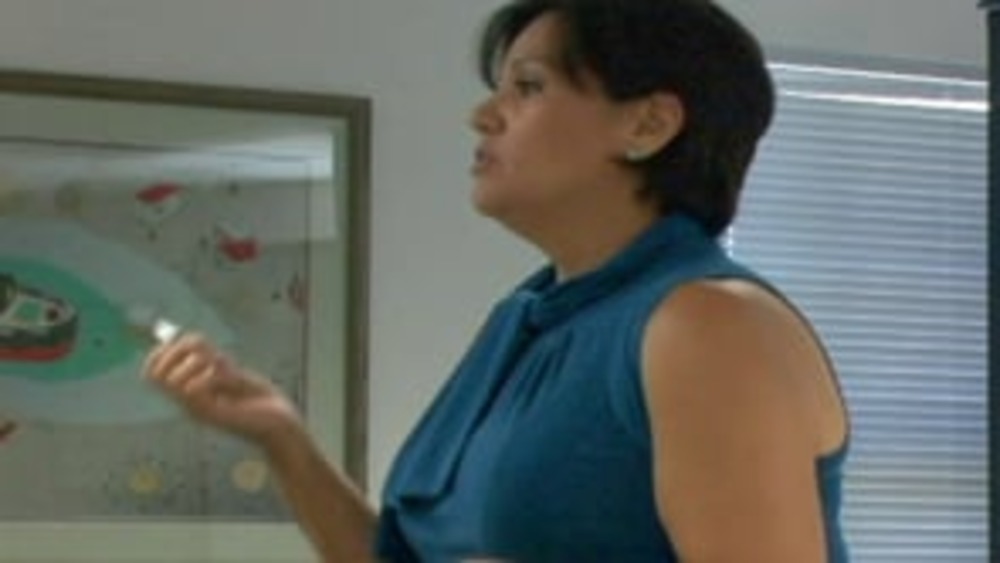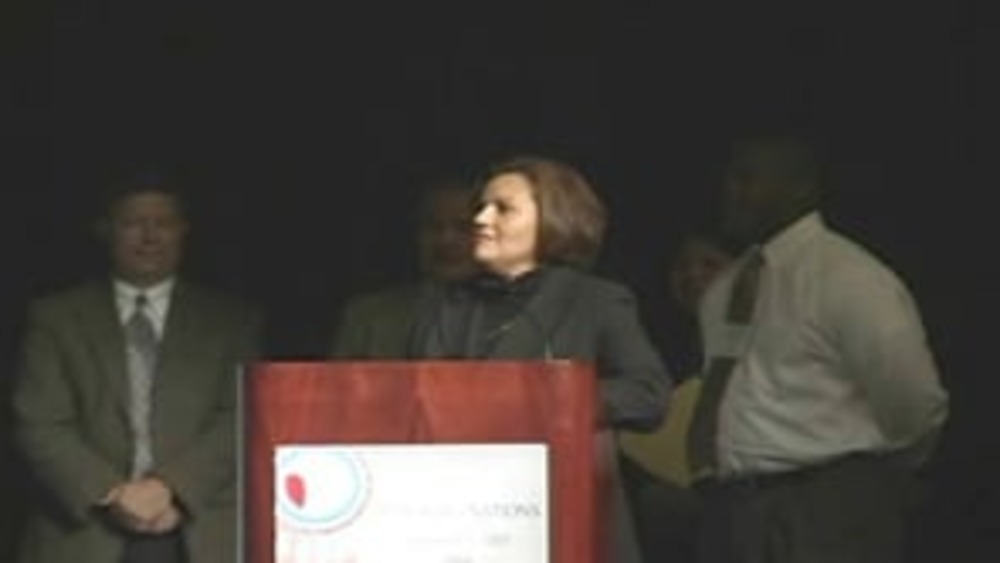Mississippi Choctaw Chief Justice Hilda Faye Nickey discusses the Choctaw tribal court system, and provides an overview of Choctaw's youth court and how it works to educate Choctaw youth about Choctaw ethics and core values in order to set them on the right path.
Additional Information
Nickey, Hilda Faye. "The Mississippi Choctaw Tribal Court System." Honoring Nations symposium. Harvard Project on American Indian Economic Development, John F. Kennedy School of Government, Harvard University. Cambridge, Massachusetts. September 27-28, 2007. Presentation.
Transcript
Duane Champagne:
"Our next presentation is the Choctaw Tribal Courts, again, which we were very impressed with. A very efficient court system, one that has a very strong emphasis on youth courts. And the presenter today is Hilda Faye Nickey; she's the Senior Youth Court Judge. So, Hilda, why don't you tell us the story?"
Hilda Faye Nickey:
"Good afternoon. [Choctaw greeting] from Choctaw. I was going to talk about Choctaw Tribal Youth Court. We were one of the programs that was awarded [in] 2006. And we presented a lot of programs that we were including in our court system and basically, they asked me to just bring an update of what's been going on and what we're doing so far. As introduced, I am a youth court judge and I deal directly with youth court, youth court program, youth court services and anything to do with youth court; juvenile offenders, child welfare cases, and everything with the children, family and youth.
First of all, I want to go back and kind of tell you a little history of our court system. Before 1997, our court system only consisted of one court, one small courtroom, one chief judge, two associate judges, part-time basis, and one special law trained judge. And we -- the chief judge and the two associates were the only ones handling all our cases. And then by 1997, with the growing population of the tribe, as well as advanced economic development on the reservation, the tribal council and the tribal government decided that they needed to reorganize the tribal court system. And when they reorganized, they really reorganized.
After the reorganization, we had from one chief judge to two associate judges and one special judge, we [wound] up with eight -- excuse me, four senior judges and four associates judges. And then later, in 2000, when they included the Supreme Court, we had one chief justice and two associate justices; so, a total of eleven judges [are] in the system now. And everybody has their own distinct court. And I also want to mention that when we were in Tulsa we were talking about our new state-of-the-art facility that we were hoping to move into. Well, we finally have and it's gorgeous. It's wonderful. Each court system [has] their own courtroom, a large courtroom, about this size here. And we have three courtrooms, civil, youth, and criminal, and the Supreme Court shares with the criminal court. But we are very proud of it. All the legal communities are within that building; the legal defense, the attorney general's office, as well as federal magistrate court judge office is there, as well as the attorney general or the state attorney general. We have our own established detention facilities, youth detention, and adult detention; and basically, we're just very proud of that facility. Whenever you're in Choctaw, please come by and look over our facility. And that's the little history of the Choctaw Tribal Court.
What I'm going to be talking about is the Youth Court. With Youth Court -- as I was saying that I work mainly with juvenile, and when you're working with kids you just have to stay ahead of them all the time, I found, and constantly thinking, and planning, and coming up with certain things to try to work with these juveniles.
Well, one time I was faced with a situation where I had this 14-year-old girl that kept coming to court over and over and over. I'd send her home, she'd spend a night in jail, I get her out, and then send her back to her parents, and then the following weekend, she would come back to court again; disobedience to lawful order of court. Well, anyway, it was just so frustrating; I didn't know what to do with this child. There was obviously something wrong at home, right? So I make referral to social service department or other service provider programs and they'd try to intervene, and they did intervene, but nothing worked. It wasn't the mom. The mom was willing to work with all these programs and was there for the child. It was just the child; the child just wasn't going to listen to authority, basically. So with that frustration and nobody, really, to help answer, or come to some sort of a solution to this problem -- so the only thing I could think of to do was to go to my elders in the community and seek advice of what is happening here; children are not listening to parents, they're not listening to officers, they're not listening to judges anymore.
Well, and then this one elder sat down and talked with me and went over what it used to be, how they were able to handle kids when they were being disruptive within the community outside the courtroom, generally. And I found other -- and I'm sure within your tribe you have some of these things that you utilize or had utilized in the past. Some of the things I found was, or ways, was a 'talking to.' I don't know if you're familiar with that but we call it [Choctaw language], or a 'talking to'. In our tribe, when a youth is being disruptive or is not listening or having bad behavior, usually the parent would -- and they're not listening to a parent, we all know that. We didn't listen to our own parent when they were telling us the right way of what to do and what not to do, right? So you know the kids doesn't listen to their own parents sometimes. Well, what I found out was that they refer to extended family members, like grandma or uncle, to do the talking to the child, 'talking to' to the child, to try to teach him what they were doing was not right, appropriate, and that they should be doing other things. And then upon 'talking to,' they also took the time to go, if it was boys, go hunting with, teach them how to fish, and other things that, just to keep them busy, and just to show them that there are other things to do rather than being a very delinquent child. And then the grandma would do that for the girl, if it was a girl that was having problems. But when we started, or I started using it in my court system, the [Choctaw language], and I called it the 'talking to' court, rather. And I've had a couple of cases that's come through my court system that I've utilized some of the stuff that I've learned from interviewing elders in the community. There are other things that they mentioned to me that I kind of disagree with, maybe not disagree but it's called [Choctaw language]. And [Choctaw language] is 'corporal punishment.' Whipping your children was a basic thing that most of the parents used. But we -- that got out of hand, so we try not to utilize that one.
And then there are other things that, doing the Indigenous law projects review survey research, we've learned a lot from our elders, at that point in time. And I agree with Ms. Theresa [Pouley] here that the important thing is, when you get them in court or anywhere else, education. We need to educate everybody, we need to educate, or re-educate, I come to find. Because a lot of these things, a lot of these ethics, values, we already know them. It's within us already; it's just that we don't practice them anymore. And if you don't practice them, like with the language, you lose it. And that's what's happening in our society, we found also that -- some of the basic concepts of respect, sharing. Sharing things, sharing food. When you have plenty of food left over, you give it to your neighbors, share it with your neighbors. If you borrow a car, if you borrow somebody's car, you make sure you take that car back full of gas and maybe washed, in perfect condition, or in the condition that you borrowed the car from. Those are some of the basic respect that we knew we're taught what to do.
I found out that our younger kids are not being taught that same ethics, the same values, and therefore I feel like the main reason why that they do not listen to parents as well as authority is because they have lost that values and ethics. And hopefully, with the Indigenous law project as we go through the process that -- and we have, we have come up with a poster. I can't tell you the exact size of this but it's about that size. A poster that reads, that tells the importance of the basic ethics and values of the community, of the tribe. And we take it to the school, to the classroom, to go over it with children, especially in first grade to the eighth grade. I asked them, 'Have you been told this before, grandma or mom or parent, did anybody tell you all this stuff before?' Out of 20 kids, we only had about, maybe, two to five that raised their hand and said they've heard it before, and the rest were not familiar with these basic values. That is our focus, for the time being, with the Indigenous law project, as well as the youth court, is to educate, to educate our youth, our children in the basic of respect, the basic respect, common respect of our ethics and values. I don't know if I have gotten to 10 minutes but that's all I have and I thank you. And it's nice seeing everybody."



